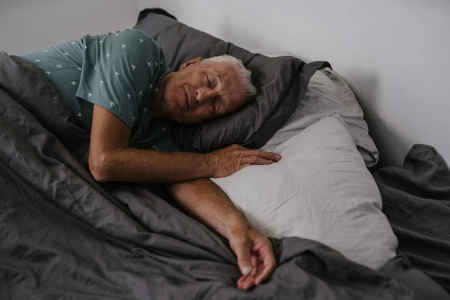Feeling exhausted every afternoon? Here’s what your nap says about your long-term health
By
Maan
- Replies 0
Feeling drowsy during the day is common—many Aussies turn to a quick nap to recharge.
But new research has raised unexpected questions about whether certain nap habits could signal something more serious.
What scientists have uncovered is now prompting a closer look at how—and when—we rest during the day.
Feeling sluggish in the middle of the day? You might be tempted to sneak in a quick nap to recharge—but new research has suggested that when and how you nap could have unexpected consequences for your health.
A study published in Sleep stirred debate among scientists and health professionals after it linked certain daytime napping habits with a higher risk of death in middle-aged and older adults.
Researchers analysed data from more than 86,000 participants in the UK Biobank—none of whom worked night shifts—ranging in age from 43 to 79, with an average age of 63.
Over a span of 11 years, 5819 participants died. Using wearable activity trackers, the researchers monitored their sleep and activity patterns, defining naps as any sleep that occurred between 9:00 am and 7:00 pm.
But it wasn’t just about whether someone napped. The study focused on three specific behaviours: longer nap durations, frequent variability in nap length from day to day, and a tendency to nap around midday and early afternoon.
These particular habits stood out.
‘Our study fills a gap in knowledge by showing that not just whether someone naps, but how long, how variable, and when they nap during the day may be meaningful indicators of future health risk,’ lead author Chenlu Gao, PhD, a postdoctoral research fellow at Massachusetts General Hospital in Boston, shared.
She noted that earlier research often relied on self-reported data, which is ‘subject to recall bias’, and emphasised the importance of objectively assessed nap behaviours.
While previous studies have explored links between night-time sleep and mortality, Gao and her team said they were particularly interested in what daytime napping might reveal.
‘We saw a critical need to investigate whether objectively assessed napping behaviours are associated with longevity,’ she explained.
Even after adjusting for factors such as body mass index, alcohol consumption, smoking, and overnight sleep duration, the link between those three nap habits and increased mortality remained.
However, the study did not claim that naps directly caused early death—it only found an association. Whether these findings apply to the wider population is also still unknown.
So why might naps be connected to mortality at all?
Some sleep experts have pointed to underlying medical conditions as a possible explanation. Sleep disorders like sleep apnoea or energy-draining illnesses such as heart disease may lead people to nap more often or at odd hours—potentially explaining the observed risks.
The study tried to account for lifestyle factors, but undiagnosed conditions may have still played a role.
Other researchers have proposed a different theory: that long, irregular naps during the middle of the day may interfere with circadian rhythms—the body’s internal sleep-wake cycle. When this rhythm is disrupted, it can affect metabolism, inflammation levels, and cardiovascular function, all of which can influence long-term health outcomes.
For those wondering whether to give up napping entirely, experts recommended a more balanced approach.
If you do need to nap, keeping it under 30 minutes could leave you feeling refreshed without grogginess. Napping earlier in the day, rather than around midday or afternoon, might also help prevent disruptions to your night-time sleep.
And if you notice you’re napping more often or for longer stretches than usual, it may be worth speaking to your doctor.

Have you noticed your nap habits changing as you’ve gotten older? Let us know your thoughts in the comments.
But new research has raised unexpected questions about whether certain nap habits could signal something more serious.
What scientists have uncovered is now prompting a closer look at how—and when—we rest during the day.
Feeling sluggish in the middle of the day? You might be tempted to sneak in a quick nap to recharge—but new research has suggested that when and how you nap could have unexpected consequences for your health.
A study published in Sleep stirred debate among scientists and health professionals after it linked certain daytime napping habits with a higher risk of death in middle-aged and older adults.
Researchers analysed data from more than 86,000 participants in the UK Biobank—none of whom worked night shifts—ranging in age from 43 to 79, with an average age of 63.
Over a span of 11 years, 5819 participants died. Using wearable activity trackers, the researchers monitored their sleep and activity patterns, defining naps as any sleep that occurred between 9:00 am and 7:00 pm.
But it wasn’t just about whether someone napped. The study focused on three specific behaviours: longer nap durations, frequent variability in nap length from day to day, and a tendency to nap around midday and early afternoon.
These particular habits stood out.
‘Our study fills a gap in knowledge by showing that not just whether someone naps, but how long, how variable, and when they nap during the day may be meaningful indicators of future health risk,’ lead author Chenlu Gao, PhD, a postdoctoral research fellow at Massachusetts General Hospital in Boston, shared.
She noted that earlier research often relied on self-reported data, which is ‘subject to recall bias’, and emphasised the importance of objectively assessed nap behaviours.
While previous studies have explored links between night-time sleep and mortality, Gao and her team said they were particularly interested in what daytime napping might reveal.
‘We saw a critical need to investigate whether objectively assessed napping behaviours are associated with longevity,’ she explained.
Even after adjusting for factors such as body mass index, alcohol consumption, smoking, and overnight sleep duration, the link between those three nap habits and increased mortality remained.
However, the study did not claim that naps directly caused early death—it only found an association. Whether these findings apply to the wider population is also still unknown.
So why might naps be connected to mortality at all?
Some sleep experts have pointed to underlying medical conditions as a possible explanation. Sleep disorders like sleep apnoea or energy-draining illnesses such as heart disease may lead people to nap more often or at odd hours—potentially explaining the observed risks.
The study tried to account for lifestyle factors, but undiagnosed conditions may have still played a role.
Other researchers have proposed a different theory: that long, irregular naps during the middle of the day may interfere with circadian rhythms—the body’s internal sleep-wake cycle. When this rhythm is disrupted, it can affect metabolism, inflammation levels, and cardiovascular function, all of which can influence long-term health outcomes.
For those wondering whether to give up napping entirely, experts recommended a more balanced approach.
If you do need to nap, keeping it under 30 minutes could leave you feeling refreshed without grogginess. Napping earlier in the day, rather than around midday or afternoon, might also help prevent disruptions to your night-time sleep.
And if you notice you’re napping more often or for longer stretches than usual, it may be worth speaking to your doctor.
Key Takeaways
- A study of over 86,000 adults found certain napping habits were linked to a higher risk of death.
- Longer naps, inconsistent nap durations, and naps around midday showed the strongest associations.
- The link remained even after accounting for lifestyle factors, but the study did not prove causation.
- Experts suggest short naps earlier in the day and consulting a doctor if frequent napping becomes routine.
Have you noticed your nap habits changing as you’ve gotten older? Let us know your thoughts in the comments.








